On this Day in History ... 29th April
29 Apr is in April.
Events on the 29th April
Archaeologia Volume 35 1853 XXXIII. On the 29th, being still at Shene, Isabella [Map] is visited by Edward III (age 45)., the Lady Isabella (age 25) ( the King's eldest daughter ), and the Earl of March (age 29), who sup with her.

On 29 Apr 1417 King Louis of Naples (age 39) died. His son Louis Valois Anjou III Duke Anjou (age 13) succeeded Louis III Duke Anjou.
On 29 Apr 1424 Archibald Douglas 1st Duke Touraine (age 52) was created 1st Duke Touraine by Charles "Victorious" VII King France (age 21); he was the first non-Frenchman to be appiinted Duke in France. Charles had also appointed him Lieutenant General in the waging of war in the Kingdom of France. Margaret Stewart Duchess Touraine by marriage Duchess Touraine.

Letters 1536. 29 Apr 1536. Vienna Archives. 752. Chapuys (age 46) to Charles V.
The Grand Ecuyer [Esquire], Mr. Caro (age 40), had on St. George's day the Order of the Garter in the place of the deceased M. de Burgain, to the great disappointment of Rochford (age 33), who was seeking for it, and all the more because the Concubine (age 35) has not had sufficient influence to get it for her brother; and it will not be the fault of the said Ecuyer if the Concubine, although his cousin (quelque, qu. quoique? cousine) be not dismounted. He continually counsels Mrs. Semel [Jane Seymour (age 27)] and other conspirators "pour luy faire une venue," [to make him a visit] and only four days ago he and some persons of the chamber sent to tell the Princess (age 20) to be of good cheer, for shortly the opposite party would put water in their wine, for the King was already as sick and tired of the concubine (age 35) as could be; and the brother of lord Montague told me yesterday at dinner that the day before the bishop of London (age 61) had been asked if the King could abandon the said concubine, and he would not give any opinion to anyone but the King himself, and before doing so he would like to know the King's own inclination, meaning to intimate that the King might leave the said concubine, but that, knowing his fickleness, he would not put himself in danger. The said Bishop was the principal cause and instrument of the first divorce, of which he heartily repents, and would still more gladly promote this, the said concubine and all her race are such abominable Lutherans. London, 29 April 1536. Fr., from a modern copy, pp. 2.




Wriothesley's Chronicle 29 Apr 1554. 29 Apr 1554. The 29 of Aprill Sir James Croft (age 36), knight, was arrayned in the Guildhall [Map] of treason, and there by a jurie of the citizens of London condemned and had judgment of death.
On 29 Apr 1587 the English fleet commanded by Francis Drake (age 47) entered the Bay of Cádiz Spain in the evening to discover sixty Spanish and twenty French ships. The Spanish ships, under the command of Pedro de Acuña, sailed out to meet the English fleet but were forced to retire back to Cadiz before the superiority of the English. Gun positions on the shore opened fire, shelling the English fleet from the coast with little effect. During the night of the 29th and all the following day and night the battle raged in the bay. At dawn on 1 May, the English withdrew having destroyed around thirty-two Spanish ships, with a combined capacity of 10,000 tons, and captured four other ships, laden with provisions.
On 24 Jan 1630 Henry Yelverton (age 63) died. He was buried at the Church of St Peter and St Paul, Easton Maudit [Map].
On 29 Apr 1625 Mary Beale (age 43) died. She was buried at the Church of St Peter and St Paul, Easton Maudit [Map].
Elaborate canopied Jacobean Hooded Monument of alabaster, the effigies one above the other, with the figures of four sons and five daughters below. The canopy is supported by bedesmen in black gowns, and is surmounted by figures of Faith, Hope, and Charity. Above is an inscribed panel surrounded by books on end and various linked symbols with winged cherubs above. Large caryatids representing hooded bedesmen to left and right. Arch above with 3 standing figures and 2 hour-glasses on sculls.
Mary Beale: Around 1582 she was born to Robert Beale. Before 27 Mar 1602 Henry Yelverton and she were married. She the daughter of Robert Beale.
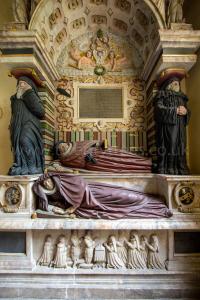
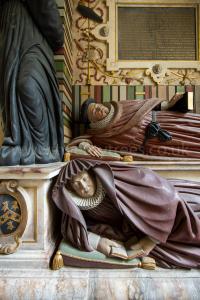
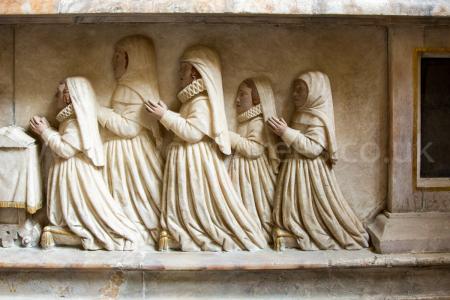
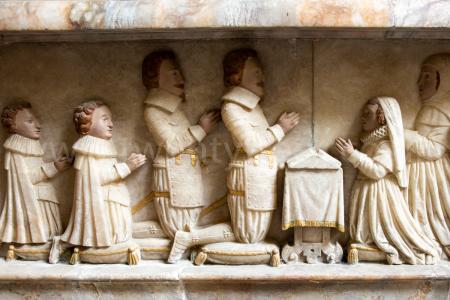
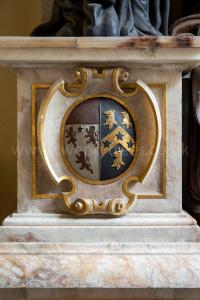
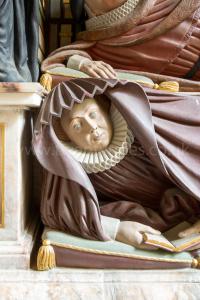
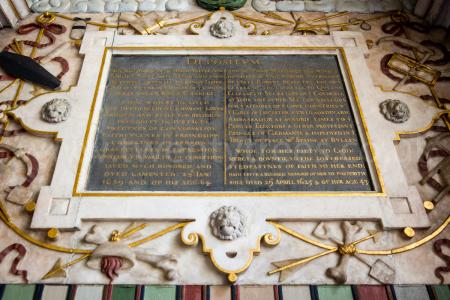
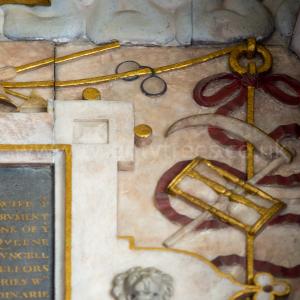
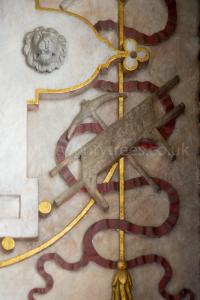
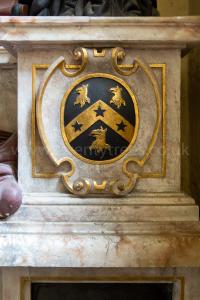
On 29 Apr 1661 William Godolphin 1st Baronet (age 21) was created 1st Baronet Godolphin.
Pepy's Diary. 29 Apr 1666. So home to dinner, and after dinner I and my boy down by water to Redriffe [Map] and thence walked to Mr. Evelyn's (age 45), where I walked in his garden till he come from Church, with great pleasure reading Ridly's discourse, all my way going and coming, upon the Civill and Ecclesiastical Law. He being come home, he and I walked together in the garden with mighty pleasure, he being a very ingenious man; and the more I know him, the more I love him. His chief business with me was to propose having my cozen Thomas Pepys in Commission of the Peace, which I do not know what to say to till I speake with him, but should be glad of it and will put him upon it.
Pepy's Diary. 29 Apr 1667. Up, being visited very early by Creed newly come from Hinchingbrooke, who went thither without my knowledge, and I believe only to save his being taxed by the Poll Bill. I did give him no very good countenance nor welcome, but took occasion to go forth and walked (he with me) to St. Dunstan's, and thence I to Sir W. Coventry's (age 39), where a good while with him, and I think he pretty kind, but that the nature of our present condition affords not matter for either of us to be pleased with any thing. We discoursed of Carcasse, whose Lord, he tells me, do make complaints that his clerk should be singled out, and my Lord Berkeley (age 65) do take his part. So he advises we would sum up all we have against him and lay it before the Duke of York (age 33); he condemned my Lord Bruncker (age 47).


On 29 Apr 1688 Frederick William "Great Elector" Hohenzollern Elector Brandenburg (age 68) died.
Evelyn's Diary. 29 Apr 1699. I dined with the Archbishop (age 62); but my business was to get him to persuade the King (age 48) to purchase the late Bishop of Worcester's (deceased) library, and build a place for his own library at St. James's, in the Park, the present one being too small.
After 29 Apr 1714. St Michael's Church, Stowe Nine Churches [Map]. Monument to Thomas Turner (deceased). Sculpted by Thomas Stayner (age 49). Baldachin. Drapery. Baroque. The figure on the left is Faith who holds a model of a circular church. The figure on the right is Thomas Turner (deceased). Segmental Pediment. Moulded Cornice.
Thomas Turner: In Sep 1645 he was born to Dean Thomas Turner and Margaret Windebank. Evelyn's Diary. 20 Dec 1685. Dr Turner, brother to yc Bp. of Ely, and sometime Tutor to my son, preach'd at Whitehall on 8 Mark 38, concerning ye submission of Christians to their persecutors, in were some passages indiscreete enough, considering yc time, and the rage of the inhumane French tyrant against the poore Protestants. On 29 Apr 1714 he died.
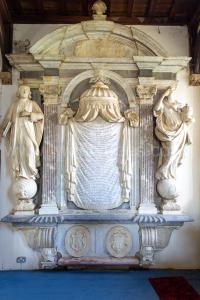
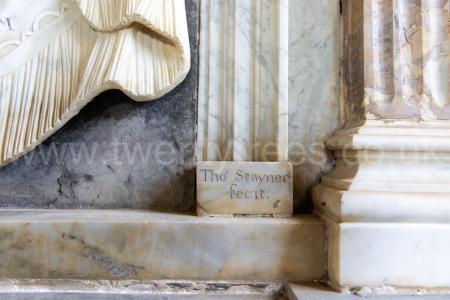
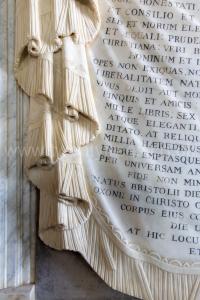
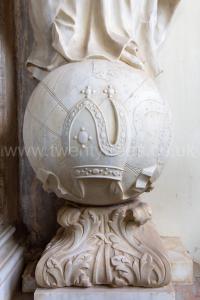
On 29 Apr 1759 Hugh Seymour-Conway was born to Francis Seymour-Conway 1st Marquess Hertford (age 40) and Isabella Fitzroy Countess Hertford (age 32). He a great x 2 grandson of King Charles II of England Scotland and Ireland.

After 29 Apr 1767. Monument at St James' Church, Kinnersley [Map] to John Morgan 4th Baronet (deceased).
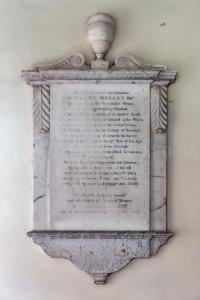
On 29 Apr 1843 Maria Terpsithea Cassavetti aka Zambaco was born to Demetrios Cassavetti and Euphrosyne m Cassavetti.
On 29 Apr 1868 Alice Frederica Edmonstone aka Keppel was born to William Edmonstone 4th Baronet (age 58) and Mary Elizabeth Parsons (age 44).
On 29 Apr 1890 Hermit (age 26) died at Blankney Hall. His skeleton was given to the Royal College of Vetinary Surgeons. A hoof was presented to the Prince of Wales who had it fashioned into an ink-stand, writing:
Marlborough House,
July 27/90.
My Dear Harry (age 49) — How kind of you to have sent me the hoof of dear old ! so prettily mounted, which I shall always greatly value and constantly use as an inkstand.
I am also very much touched by the kind expressions in your letter wishing me good luck with my racehorses. Though I can never expect to have the good fortune which attended the Dukes of Portland and Westminster, still I hope with patience to win one or more of the classic races with a horse bred by myself. I sincerely hope you may yet be able to come to Goodwood for a part of the time, at any rate.
Thanking you again for your kind remembrance of me and giving me so interesting a souvenir of your "best friend"
From yours very sincerely,
Albert Edward (age 48).
P.S.—I shall always take the shoe about with me.
On 29 Apr 1907 Dorothea Louise Ashley-Cooper Viscountess Head was born to Anthony Ashley-Cooper 9th Earl of Shaftesbury (age 37) and Constance Grosvenor Countess of Shaftesbury (age 31).

Memorials to the Mack family at St Margaret's Church, Paston [Map].
On 18 May 1933 Hugh Paston Mack died.
On 23 Dec 1917 Lieutenant Commander Ralph Michael Mack (age 34) was killed in action when his destoyer Tornado was mined.
On 29 Apr 1943 Rear-Admiral Philip John Mack (age 50) died in a plane crash.
Hugh Paston Mack: On 22 Mar 1828 he was born to John Mack of Paston Hall.
Lieutenant Commander Ralph Michael Mack: On 11 Oct 1883 he was born to Hugh Paston Mack.
Rear-Admiral Philip John Mack: On 06 Oct 1892 he was born to Major Philip Paston Mack. On 15 Sep 1905 Rear-Admiral Philip John Mack joined the Royal Navy as a naval cadet at the Osborne and Britannia Royal Naval Colleges. On 09 Aug 1910 Rear-Admiral Philip John Mack was posted to the battlecruiser Indomitable as a midshipman, transferring to the cruiser Amethyst on 15 Jul 1913 having been promoted to sub-lieutenant on 15 Jun 1913.
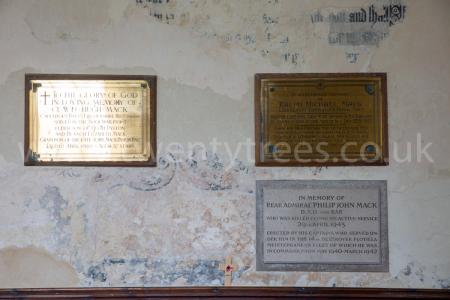
On 29 Apr 2011 William Prince of Wales (age 28) and Catherine Middleton Princess of Wales (age 29) were married. She by marriage Duchess Cambridge. He the son of King Charles III (age 62) and Diana Spencer Princess Wales. He a grandson of Queen Elizabeth II of the United Kingdom. 

Ralph Percy 12th Duke of Northumberland (age 54) and Isobel Jane Richard Duchess of Northumberland (age 52) attended.
Births on the 29th April
On 29 Apr 1469 William II Landgrave of Hesse was born to Louis II Landgrave of Hesse (age 30).
On 29 Apr 1593 Grace Grey was born to Anthony Grey 1453-1490 9th Earl Kent (age 36) and Magdelane Purefoy Countess Kent (age 21).
On 29 Apr 1643 William Fitzwilliam 1st Earl Fitzwilliam was born to William Fitzwilliam 2nd Baron Fitzwilliam (age 34).
On or before 29 Apr 1653 Thomas Tipping 1st Baronet was born to Thomas Tipping (age 37). On 29 Apr 1653 Thomas Tipping 1st Baronet was baptised.
On 29 Apr 1665 John Savage 5th Earl Rivers was born to Richard Savage.
On 29 Apr 1665 James Butler 2nd Duke Ormonde was born to Thomas Butler 6th Earl Ossory (age 30) and Emilia Nassau Beverweert Countess Ossory (age 30).
On 29 Apr 1686 Peregrine Bertie 2nd Duke Ancaster and Kesteven was born to Robert Bertie 1st Duke Ancaster and Kesteven (age 25) and Mary Wynn (age 25).

On 29 Apr 1693 Mary Anne Turner was born to Charles Turner 1st Baronet (age 26) and Mary Walpole (age 19).

On 29 Apr 1707 Christine Anna Luise Oswaldine Salm was born to Louis Otto Salm Count Salm Salm (age 32) and Albertine Johannette Nassau Hadamar Countess Salm (age 32). She a great x 3 granddaughter of King James I of England and Ireland and VI of Scotland.
On 29 Apr 1726 Mary Bouverie was born to Jacob Bouverie 1st Viscount Folkestone (age 31) and Mary Clarke.
On 29 Apr 1727 John Egerton 2nd Duke Bridgewater was born to Scroop Egerton 1st Duke Bridgewater (age 45) and Rachel Russell Duchess Bridgewater (age 20).

On 29 Apr 1728 Francis Sitwell was born to Johnathan Hurt (age 28) and Catherine Sitwell (age 25). When born his name was Francis Hurt. He subsequently changed his surname when his mother Catherine Sitwell (age 25) inherited the Sitwell estates and he adopted the Sitwell surname.
On 29 Apr 1752 Mary Vincent Countess Rosebery was born to Francis Vincent 7th Baronet (age 35) and Mary Howard Lady Vincent (age 30).

On 29 Apr 1758 Colonel Thomas Richard Beaumont was born.
On 29 Apr 1759 Hugh Seymour-Conway was born to Francis Seymour-Conway 1st Marquess Hertford (age 40) and Isabella Fitzroy Countess Hertford (age 32). He a great x 2 grandson of King Charles II of England Scotland and Ireland.

On 29 Apr 1766 Nicholas Vansittart 1st Baron Bexley was born to Henry Vansittart Governor of Bengal (age 33).
On 29 Apr 1766 William Mansel 10th Baronet was born to William Mansel 9th Baronet (age 27).
On 29 Apr 1778 Elizabeth Henrietta Smith-Stanley was born to Edward Smith-Stanley 12th Earl of Derby (age 25) and Elizabeth Hamilton Countess Derby (age 25).

On 29 Apr 1781 Charles Christopher Pepys 1st Earl of Cottenham was born to William Weller Pepys 1st Baronet (age 41).
On 29 Apr 1783 David Cox was born.
On 29 Apr 1791 John Wilmot Prideaux 8th Baronet was born to John Wilmot Prideaux 7th Baronet (age 43).
On 29 Apr 1810 Friedrich Wilhelm Ferdinand Württemberg was born to Alexander Württemberg Duke Württemberg (age 38) and Antoinette Ernestine Amalie Saxe Coburg Gotha Duchess Württemberg (age 30).
On 29 Apr 1818 Tsar Alexander II of Russia was born to Tsar Nicholas I of Russia (age 21) and Charlotte Hohenzollern (age 19).
On 29 Apr 1822 Colonel Herbert Watkin Williams-Wynn was born to Watkin Williams-Wynn 5th Baronet (age 49) and Henrietta Antonia Clive Lady Williams-Wynn.
On 29 Apr 1825 George Edward Cockayne was born to William Adams aka Cockayne of Dummer Grange and Mary Anne Cockayne (age 43).

On 29 Apr 1829 Edward Knatchbull-Hugessen 1st Baron Brabourne was born to Edward Knatchbull 9th Baronet (age 47) and Fanny Catherine Knight Lady Knatchbull (age 36).
On 29 Apr 1841 Francis Grenfell 1st Baron Grenfell was born to Pascoe St Leger Grenfell (age 43).
On 29 Apr 1841 George Stanley Byng 8th Viscount Torrington was born to Robert Barlow Palmer Byng (age 24).
On 29 Apr 1843 Constance Rothschild Baroness Battersea was born to Anthony Rothschild 1st Baronet (age 32) and Louisa Montefiore Lady Rothschild (age 21) Coefficient of inbreeding 3.12%.
On 29 Apr 1843 Maria Terpsithea Cassavetti aka Zambaco was born to Demetrios Cassavetti and Euphrosyne m Cassavetti.
On 29 Apr 1846 Ponsonby William Moore 9th Earl of Drogheda was born to Ponsonby Arthur Moore (age 29) and Augusta Sophia Moore (age 22).
On 29 Apr 1848 Theodore Blake Wirgman was born.
On 27 Mar 1849 Amy Royds was born to Reverend Edward Royds (age 28) and Anne Mary Littledale (age 28). She was baptised at St Oswald's Church, Brereton [Map] on 29 Apr 1849. Coefficient of inbreeding 6.25%.
On 29 Apr 1852 Gerald Richard Brooke was born to Francis Richard Brooke of Summerton in Dublin (age 37) and Henrietta Monck.

On 29 Apr 1864 Philip Grey Egerton 12th Baronet was born to Philip le Belward Grey-Egerton 11th Baronet (age 31) and Henrietta Denison Lady Egerton (age 28).

On 29 Apr 1868 Alice Frederica Edmonstone aka Keppel was born to William Edmonstone 4th Baronet (age 58) and Mary Elizabeth Parsons (age 44).
On 29 Apr 1895 Violet Meeking was born.
On 29 Apr 1898 Edward O'Bryen Hoare 7th Baronet was born to Sydney James O'Bryen Hoare 6th Baronet (age 37).
On 29 Apr 1906 George William Blackett 10th Baronet was born to Hugh Douglas Blackett 8th Baronet (age 33) and Helen Katharine Lowther Lady Blackett (age 29).

On 29 Apr 1907 Dorothea Louise Ashley-Cooper Viscountess Head was born to Anthony Ashley-Cooper 9th Earl of Shaftesbury (age 37) and Constance Grosvenor Countess of Shaftesbury (age 31).

On 29 Apr 1925 Pamela Wyndham-Quin Baroness Leconfield and Egremont was born to Captain Valentine Maurice Wyndham-Quin (age 34) at 66 Oxford Terrace, Paddington.
On 29 Apr 1935 Jean Margaret Wallop Countess of Carnarvon was born to Oliver Malcolm Wallop (age 29) at Big Horn, Sheridan.
On 29 Apr 1936 Nathaniel Charles Jacob Rothschild 4th Baron Rothschild was born to Nathaniel Mayer Victor Rothschild 3rd Baron Rothschild (age 25).
On 29 Apr 1939 David Howard 7th Earl of Effingham was born to John Algernon Howard.
On 29 Apr 1944 Robert Julian Henry Darling 3rd Baron Darling was born to Robert Charles Darling 2nd Baron Darling (age 24) and Bridget Rosemary Whishaw Dickson Baroness Darling (age 26).
On 29 Apr 1951 Sarah Rose Winnington Countess Gainsborough was born to Colonel Thomas Foley Churchill Winnington (age 40) and Betty Marjorie Anson (age 34).
Marriages on the 29th April
After 29 Apr 1458 William Sinclair 2nd Lord Sinclair (age 22) and Christian Leslie Lady Sinclair were married. He the son of William Sinclair 3rd Earl Orkney 1st Earl Caithness (age 48) and Elizabeth Douglas Countess Buchan and Orkney and Caithness.
On 29 Apr 1548 Francis II Duke Guise (age 29) and Anna d'Este (age 16) were married in Saint-Germain-en-Laye. They had seven children. He the son of Claude Lorraine 1st Duke Guise (age 51) and Antoinette Bourbon Duchess of Guise (age 55). They were third cousin once removed.
On 29 Apr 1555 Edward Unton (age 21) and Anne Seymour (age 17) were married. They had seven children. She the daughter of Edward Seymour 1st Duke of Somerset and Anne Stanhope Duchess Somerset (age 58). She a great x 5 granddaughter of King Edward III of England. 

On 29 Apr 1566 Jacques of Savoy 2nd Duke of Nemours (age 34) and Anna d'Este (age 34) were married. They were third cousin once removed.
On 29 Apr 1584 Vincenzo Gonzaga III Duke Mantua (age 21) and Eleanor de Medici Duchess Mantua (age 17) were married. They were first cousins.
Before 29 Apr 1593 Anthony Grey 1453-1490 9th Earl Kent (age 36) and Magdelane Purefoy Countess Kent (age 21) were married. She by marriage Countess Kent.
On 29 Apr 1609 Richard Barrow and Temperance Flowerdew (age 19) were married at St Gregory by St Paul's.
On 29 Apr 1656 William Hamilton Duke Hamilton (age 21) and Anne Hamilton 3rd Duchess Hamilton (age 24) were married. She by marriage Countess Selkirk. He by marriage Duke Hamilton. She the daughter of James Hamilton 1st Duke Hamilton and Mary Feilding Duchess Hamilton. He the son of William Douglas 1st Marquess Douglas (age 67) and Mary Gordon Marchioness Douglas (age 56). They were third cousins.

On or after 29 Apr 1672 Andrew Fountaine (age 39) and Sarah Chicheley were married.
Before 29 Apr 1681 Thomas Wodehouse and Anne Armine (age 29) were married.
On 29 Apr 1686 William des Bouverie 1st Baronet (age 29) and Anne Urry Lady Bouverie (age 21) were married.
On 29 Apr 1695 Henry Thynne (age 20) and Grace Strode were married. She being the heiress of her father brought £20,000 to the marriage.

On 29 Apr 1697 John Hamilton-Leslie 9th Earl of Rothes (age 18) and Jean Hay were married. She the daughter of John Hay 2nd Marquess Teviotdale (age 52) and Mary Maitland Marchioness Teviotdale. He the son of Charles Hamilton 5th Earl Haddington and Margaret Leslie 8th Countess Rothes and Haddington. They were half third cousin once removed.

On 29 Apr 1707 Thomas Bransby (age 36) and Elizabeth m Bransby (age 21) were married.
On 29 Apr 1796 Samuel Young 1st Baronet (age 20) and Emily Baring (age 20) were married.
On 29 Apr 1817 Hugh Percy 3rd Duke Northumberland (age 32) and Charlotte Herbert Duchess Northumberland (age 29) were married at Northumberland aka Suffolk House Strand. She the daughter of Edward Clive 1st Earl Powis (age 63) and Henrietta Antonia Herbert 3rd Countess Powis (age 58). He the son of Hugh Percy 2nd Duke Northumberland (age 74) and Frances Julia Burrell Duchess Northumberland (age 64). She a great x 4 granddaughter of King James II of England Scotland and Ireland. 

On 29 Apr 1832 Captain George William St John-Mildmay (age 40) and Mary Baillie (age 30) were married at St George's Church, Hanover Square.
Before 29 Apr 1837 Reverend Augustus Fitzroy (age 27) and Angelina Mary O'Brien (deceased) were married. He a great x 4 grandson of King Charles II of England Scotland and Ireland. 
Before 29 Apr 1843 Demetrios Cassavetti and Euphrosyne m Cassavetti were married.
Before 29 Apr 1846 Ponsonby Arthur Moore (age 29) and Augusta Sophia Moore (age 22) were married.
On 29 Apr 1846 George Leveson-Gower aka Egerton 2nd Earl Ellesmere (age 22) and Mary Louisa Campbell Countess Ellesmere (age 21) were married. She the daughter of John Campbell 1st Earl Cawdor (age 55) and Elizabeth Thynne Countess Cawdor (age 51). He the son of Francis Leveson Gower aka Egerton 1st Earl Ellesmere (age 46) and Harriet Greville Countess Ellesmere (age 43). They were second cousin once removed.

On 29 Apr 1847 James Brownlow William Gascoyne-Cecil 2nd Marquess Salisbury (age 56) and Mary Catherine Sackville-West Marchioness Salisbury (age 22) were married. She by marriage Marchioness Salisbury in Wiltshire. The difference in their ages was 33 years. She the daughter of George Sackville-West 5th Earl De La Warr (age 55) and Elizabeth Sackville Countess De La Warr (age 51). He the son of James Cecil 1st Marquess Salisbury and Mary Amelia Hill Marchioness Salisbury.


On 29 Apr 1862 General Percy Feilding (age 34) and Louisa Isabella Harriet Thynne (age 28) were married. She the daughter of Henry Frederick Thynne 3rd Marquess of Bath and Harriet Baring Marchioness Bath (age 57). He the son of William Feilding 6th Earl Desmond 7th Earl Denbigh (age 66) and Mary Elizabeth Kitty Moreton Countess Desmond and Denbigh.
On 29 Apr 1869 Henry Fitzroy (age 61) and Hannah Meyer Rothschild were married. He a great x 4 grandson of King Charles II of England Scotland and Ireland. 
On 29 Apr 1875 Rowland Hill aka Clegg-Hill 3rd Viscount Hill (age 41) and Isabella Elizabeth Wynn Viscountess Hill (age 30) were married. She by marriage Viscountess Hill of Hawkestone and Hardwicke in Shropshire.
On 29 Apr 1891 Colonel Alfred Nathaniel Curzon (age 31) and Henrietta Mary Montagu were married.
On 29 Apr 1899 Thomas Brand 3rd Viscount Hampden (age 30) and Katharine Mary Montagu-Douglas-Scott (age 24) were married. She the daughter of William Scott 6th Duke Buccleuch 8th Duke Queensberry (age 67) and Louisa Jane Hamilton Duchess Buccleuch and Queensbury (age 62). They were third cousin once removed. She a great x 5 granddaughter of King Charles II of England Scotland and Ireland. 
On 29 Apr 1909 Leopold Guy Greville 6th Earl Warwick 6th Earl Brooke (age 26) and Elfrida Marjorie Eden Countess Warwick and Brooke (age 22) were married. He the son of Francis Greville 5th Earl Warwick 5th Earl Brooke (age 56) and Frances Evelyn "Daisy" Maynard Countess Warwick (age 47).
On 29 Apr 1935 Thomas Aubrey Watson 4th Baronet (age 23) and Ella Marguerite Farrar Lady Watson were married. She by marriage Lady Watson of Henrietta Street, Cavendish Square, Middlesex.
On 29 Apr 1939 John Sutherland Egerton 6th Duke Sutherland (age 23) and Diana Evelyn Percy Countess Ellesmere (age 21) were married. She the daughter of Alan Ian Percy 8th Duke Northumberland and Helen Gordon-Lennox Duchess Northumberland (age 52). He the son of John Francis Granville Scrope Egerton 4th Earl Ellesmere (age 66) and Violet Lambton Countess Ellesmere (age 58). They were fourth cousins.

On 29 Apr 2011 William Prince of Wales (age 28) and Catherine Middleton Princess of Wales (age 29) were married. She by marriage Duchess Cambridge. He the son of King Charles III (age 62) and Diana Spencer Princess Wales. He a grandson of Queen Elizabeth II of the United Kingdom. 

Ralph Percy 12th Duke of Northumberland (age 54) and Isobel Jane Richard Duchess of Northumberland (age 52) attended.
Deaths on the 29th April
On 29 Apr 744 Bishop Wilfrith of Worcester died.
On 29 Apr 1244 Blanche Capet (age 3) died.
On 29 Apr 1286 John Comyn (age 63) died.
On 29 Apr 1300 Isabelle Dreux (age 36) died.
On 29 Apr 1310 Robert Fitzroger 5th Baron Warkworth (age 70) died at Clavering. Baron Warkworth extinct.
On 29 Apr 1360 Beatrix Wittelsbach (age 58) died.
On 29 Apr 1417 King Louis of Naples (age 39) died. His son Louis Valois Anjou III Duke Anjou (age 13) succeeded Louis III Duke Anjou.
On 29 Apr 1500 Thomas Waldegrave (age 75) died.
On 29 Apr 1539 Philip Aviz (age 6) died.
On 29 Apr 1563 James Stumpe died.
On 29 Apr 1579 Bishop Richard Cheyney (age 66) died.
On 29 Apr 1608 Maria Anna Wittelsbach (age 57) died.
On 29 Apr 1617 Drue Drury (age 86) died.
On 29 Apr 1617 Bridget Drury (age 82) died.
On 29 Apr 1622 Henry Capell (age 43) died at Rayne.
On 29 Apr 1626 Anne Howard (age 44) died.
On 24 Jan 1630 Henry Yelverton (age 63) died. He was buried at the Church of St Peter and St Paul, Easton Maudit [Map].
On 29 Apr 1625 Mary Beale (age 43) died. She was buried at the Church of St Peter and St Paul, Easton Maudit [Map].
Elaborate canopied Jacobean Hooded Monument of alabaster, the effigies one above the other, with the figures of four sons and five daughters below. The canopy is supported by bedesmen in black gowns, and is surmounted by figures of Faith, Hope, and Charity. Above is an inscribed panel surrounded by books on end and various linked symbols with winged cherubs above. Large caryatids representing hooded bedesmen to left and right. Arch above with 3 standing figures and 2 hour-glasses on sculls.
Mary Beale: Around 1582 she was born to Robert Beale. Before 27 Mar 1602 Henry Yelverton and she were married. She the daughter of Robert Beale.










On 29 Apr 1632 Thomas Thornton (age 79) died.
On 29 Apr 1634 Mary Herbert (age 55) died.
On 29 Apr 1675 John Seymour 4th Duke of Somerset (age 30) died. He was buried at Salisbury Cathedral [Map]. His first cousin once removed Francis Seymour 5th Duke of Somerset (age 17) succeeded 5th Duke Somerset, 5th Earl Hertford, 5th Baron Beauchamp of Hatch Beauchamp in Somerset. Marquess Hertford extinct.
On 29 Apr 1676 Admiral Michiel de Ruyter (age 69) died.
On 29 Apr 1681 Thomas Wodehouse died.
Before 29 Apr 1686 Mary Edwards (age 24) died. She was buried at St Katharine Cree Church.
On 29 Apr 1686 John Perceval 3rd Baronet (age 26) died. His son Edward Perceval 4th Baronet (age 3) succeeded 4th Baronet Perceval of Kanturk in County Cork.
On 29 Apr 1686 John Tufton died.
On 29 Apr 1688 Frederick William "Great Elector" Hohenzollern Elector Brandenburg (age 68) died.
On 29 Apr 1698 Charles Cornwallis 3rd Baron Cornwallis (age 42) died. His son Charles Cornwallis 4th Baron Cornwallis (age 23) succeeded 4th Baron Cornwallis.
On 29 Apr 1705 Edward Radclyffe 2nd Earl Derwentwater (age 50) died. His son James Radclyffe 3rd Earl Derwentwater (age 15) succeeded 3rd Earl Derwentwater, 5th Baronet Radclyffe of Derwentwater in Cumberland.
On 29 Apr 1714 Thomas Turner (age 68) died.
On 29 Apr 1716 Richard Myddelton 3rd Baronet (age 61) died and was buried at St Mary's Church, Chirk [Map]. His funeral cost £365. His son William Myddelton 4th Baronet (age 22) succeeded 4th Baronet Myddelton of Chirk Castle.
On 29 Apr 1746 William Flower 1st Baron Castle Durrow (age 61) died. He was buried at Finglas, County Dublin.
On 29 Apr 1755 Philip Aston 6th Baronet (age 44) died. His brother Walter Aston 7th Baronet (age 43) succeeded 7th Baronet Aston of Tixall.
On 29 Apr 1756 Robert Meyricke died.
On 29 Apr 1767 John Morgan 4th Baronet (age 56) died without issue. Baronet Morgan of Langattock in Monmouthshire extinct.
On 29 Apr 1776 Edward Wortley-Montagu (age 62) died.
On 29 Apr 1797 Henry Tracy 8th Viscount Tracy (age 64) died.
On 29 Apr 1798 Robert Palk 1st Baronet (age 80) died at Haldon House, Devon. He was buried at St Michael's Church, Dunchideock. His son Lawrence Palk 2nd Baronet (age 32) succeeded 2nd Baronet Palk of Haldon House in Devon.
On 29 Apr 1799 Johann Adolf Saxe Coburg Altenburg (age 77) died.
On 29 Apr 1815 General James Stuart (age 74) died without issue at Charles Street, Berkeley Square.
On 29 Apr 1816 Charles Philip Stourton 17th Baron Stourton (age 63) died. His son William Joseph Stourton 18th Baron Stourton (age 39) succeeded 18th Baron Stourton.
On 29 Apr 1818 María Teresa Fernández Silva Duchess Veragua Duchess Berwick (age 46) died.
On 29 Apr 1830 Charlotte Marianne Harriet Rous died.
On 29 Apr 1831 Charles Clifford Clifford 6th Baron Clifford Chudleigh (age 72) died. His son Charles Clifford 7th Baron Clifford Chudleigh (age 40) succeeded 7th Baron Clifford of Chudleigh in Devon.
On 29 Apr 1834 Henry Wodehouse (age 35) died.
On 29 Apr 1835 Mary Paget Baroness Graves (age 52) died.
On 29 Apr 1851 Charles Christopher Pepys 1st Earl of Cottenham (age 70) died. His son Charles Edward Pepys 2nd Earl of Cottenham (age 26) succeeded 2nd Earl of Cottenham, 2nd Viscount Crowhurst of Crowhurst in Surrey, 2nd Baron Cottenham of Cottenham in Cambridgshire, 4th Baronet Pepys of Wimpole Street, 5th Baronet Pepys of Brook Street.
On 29 Apr 1854 Caroline Scott Marchioness Queensbury (age 79) died.
On 29 Apr 1854 Henry William Paget 1st Marquess Anglesey (age 85) died. His son Henry Paget 2nd Marquess Anglesey (age 56) succeeded 2nd Marquess Anglesey, 3rd Earl Uxbridge, 5th Baronet Bayly of Plas Newydd in Anglesey. Henrietta Bagot Marchioness Anglesey by marriage Marchioness Anglesey.

On 29 Apr 1860 Frederica Markham Countess Mansfield (age 86) died.
On 29 Apr 1863 Jane Elizabeth Coke (age 85) died in a shooting accident at Holkham Hall, Norfolk.
On 29 Apr 1879 Anne Wentworth-Fitzwilliam (age 59) died.
On 29 Apr 1888 Maria Philadelphia Cotton died.
On 29 Apr 1890 Hermit (age 26) died at Blankney Hall. His skeleton was given to the Royal College of Vetinary Surgeons. A hoof was presented to the Prince of Wales who had it fashioned into an ink-stand, writing:
Marlborough House,
July 27/90.
My Dear Harry (age 49) — How kind of you to have sent me the hoof of dear old ! so prettily mounted, which I shall always greatly value and constantly use as an inkstand.
I am also very much touched by the kind expressions in your letter wishing me good luck with my racehorses. Though I can never expect to have the good fortune which attended the Dukes of Portland and Westminster, still I hope with patience to win one or more of the classic races with a horse bred by myself. I sincerely hope you may yet be able to come to Goodwood for a part of the time, at any rate.
Thanking you again for your kind remembrance of me and giving me so interesting a souvenir of your "best friend"
From yours very sincerely,
Albert Edward (age 48).
P.S.—I shall always take the shoe about with me.
On 29 Apr 1892 Alexander Hood 3rd Baronet (age 73) died at his home St Audries House, West Quantoxhead. His son Alexander Fuller-Acland-Hood 1st Baron St Audries (age 38) succeeded 4th Baronet Hood of Tidlake in Surrey. Mildred Rose Evelyn Eveleigh-de-Moleyns Baroness St Audries by marriage Lady Hood of Tidlake in Surrey.
On 29 Apr 1893 George de Yarburgh-Bateson 2nd Baron Deramore (age 70) died. His son Robert Wilfred de Yarburgh-Bateson 3rd Baron Deramore (age 27) succeeded 3rd Baron Deramore of Belvoir in County Down, 4th Baronet Bateson of Belvoir Park in County Down.
On 29 Apr 1901 Percy Barrington 8th Viscount Barrington (age 76) died. His son William Bulkeley Barrington 9th Viscount Barrington (age 53) succeeded 9th Viscount Barrington of Ardglass in County Down, 8th Viscount Barrington of Ardglass in County Down, 3rd Baron Shute of Beckett in Berkshire. Mary Isabella Bogue Viscountess Barrington (age 53) by marriage Viscountess Barrington of Ardglass in County Down.
On 29 Apr 1905 Edmund Beckett 1st Baron Grimthorpe (age 88) died after a fall. He was buried at St Alban's Cathedral [Map]. His nephew Ernest William Beckett 2nd Baron Grimthorpe (age 48) succeeded 2nd Baron Grimthorpe, 6th Baronet Beckett of Leeds.
On 29 Apr 1906 William Murray 5th and 4th Earl Mansfield (age 45) died. His brother Alan David Murray 5th and 6th Earl Mansfield (age 42) succeeded 6th Earl Mansfield in Middlesex, 5th Earl Mansfield in Nottinghamshire, 11th Viscount Stormont.
On 29 Apr 1907 Dudley Fitzgerald De Ros 23rd Baron Ros Helmsley (age 80) died at Old Court, County Down. His daughter Mary Fitzgerald De Ros 24th Baroness Ros of Helmsley (age 52) succeeded 24th Baroness Ros Helmsley.
On 29 Apr 1908 Thomas Graham Smith died of his burn injuries when he fell while carrying a lighted candle and set his clothes on fire. Asquith (age 55) attended the inquest at Easton Grey.
On 29 Apr 1922 Denis Le Marchant 3rd Baronet (age 51) died. His brother Edward Thomas Le Marchant 4th Baronet (age 50) succeeded 4th Baronet Le Marchant of Chobham Place in Surrey.
On 29 Apr 1929 Arthur Hugh Grosvenor (age 68) died. He was buried at St Mary's Church, Eccleston [Map].
Memorials to the Mack family at St Margaret's Church, Paston [Map].
On 18 May 1933 Hugh Paston Mack died.
On 23 Dec 1917 Lieutenant Commander Ralph Michael Mack (age 34) was killed in action when his destoyer Tornado was mined.
On 29 Apr 1943 Rear-Admiral Philip John Mack (age 50) died in a plane crash.
Hugh Paston Mack: On 22 Mar 1828 he was born to John Mack of Paston Hall.
Lieutenant Commander Ralph Michael Mack: On 11 Oct 1883 he was born to Hugh Paston Mack.
Rear-Admiral Philip John Mack: On 06 Oct 1892 he was born to Major Philip Paston Mack. On 15 Sep 1905 Rear-Admiral Philip John Mack joined the Royal Navy as a naval cadet at the Osborne and Britannia Royal Naval Colleges. On 09 Aug 1910 Rear-Admiral Philip John Mack was posted to the battlecruiser Indomitable as a midshipman, transferring to the cruiser Amethyst on 15 Jul 1913 having been promoted to sub-lieutenant on 15 Jun 1913.

On 29 Apr 1937 Mary Constance Wyndham Countess Wemyss (age 74) died.
On 29 Apr 1948 Harry Talbot Rice (age 58) died.
On 29 Apr 1974 Brian Robertson 1st Baron Robertson of Oakridge (age 77) died. His son William Robertson 2nd Baron Robertson (age 43) succeeded 2nd Baron Robertson of Oakridge in Gloucestershire, 3rd Baronet Robertson of Welbourn in Lincolnshire.
On 29 Apr 1986 John Rochfort D'Oyly 13th Baronet (age 86) died. His brother Nigel Hadley D'Oyly 14th Baronet (age 71) succeeded 14th Baronet D'Oyly of Shottisham in Suffolk.
On 29 Apr 2004 John Patrick Edward Chandos Henniker-Major 8th Baron Henniker (age 88) died. His son Mark Ian Philip Chandos Henniker-Major 9th Baron Henniker (age 56) succeeded 9th Baron Henniker of Stratford upon Slaney in County Wicklow, 10th Baronet Major of Worlingsworth Hall in Suffolk.